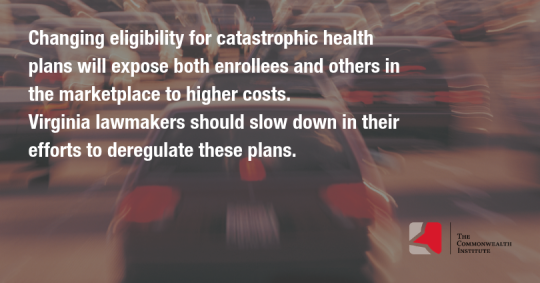February 15, 2019
Pump the Brakes on Green-lighting High-Deductible Catastrophic Plans
The Virginia General Assembly has approved SB1027 to restructure eligibility for catastrophic health plans. This will expose new enrollees to high out-of-pocket costs and expose everyone in the Affordable Care Act (ACA) marketplace to higher premiums.
Catastrophic plans generally have lower monthly premiums compared to other ACA plans, but also carry a high deductible of $7,900. Until that deductible is met, the plan will not cover anything except three primary care visits a year. These catastrophic plans are currently available to those under 30 or those who qualify for a financial hardship waiver. These regulations are structured in order to mostly limit the catastrophic plans to young, low-risk individuals, thereby allowing the plans to keep premiums low.
The bill that will arrive on the governor’s desk would allow anyone, regardless of age or circumstance, to apply for these high-deductible plans. The lower premiums of catastrophic plans may be a draw for individuals over 30 who have self-perceived good health. (Over time, the influx of older, higher-risk, individuals to these plans may cause issuers to raise premiums for catastrophic plans.) At the same time, sicker, higher-cost individuals who anticipate medical services, and therefore would be hesitant to take on the high deductible of a catastrophic plan, will remain in traditional marketplace plans. This lack of balance within the risk pool will likely lead to higher premiums across all plans.
The deregulation of catastrophic plans would essentially create a new “copper” (bottom) tier of ACA marketplace coverage. The current metal tier marketplace plans (platinum, gold, silver, and bronze) vary in coverage and price and are available to anyone regardless of age. These marketplace plans (excluding catastrophic plans) are offered with subsidies in the form of tax credits for those earning less than 400 percent of the federal poverty level ($49,960 for an individual or $85,320 for a family of three). Individuals who don’t qualify for these subsidies would be hardest hit by rising premiums.
Virginia is not the first state to consider this change in catastrophic plan eligibility. In May 2018, Colorado state legislators passed a bill which instructed their state insurance agency to study the feasibility of applying for a federal waiver to expand catastrophic plans in their state. Upon hiring an independent agency to conduct an analysis, they found expanding catastrophic plans could lead to up to a $290 increase in average annual premium costs for individuals who access coverage through the marketplace.
The independent analysis also notes the federal government would incur additional costs due to having to pay for higher subsidies for those who qualify for them. The federal waiver needed to implement the eligibility changes for catastrophic plans notes that any changes must not create additional costs to the federal government. The findings of this study mean that the expansion of catastrophic plans is likely to be denied by CMS due to additional costs associated with having to pay higher subsidies. Virginia would also likely lose money in the process of applying for this federal waiver. The state cost of preparing the application has been estimated to be $250,000.

Last year, Gov. Northam vetoed an identical bill that would have eliminated eligibility criteria for catastrophic health plans, citing the risks of underinsured Virginians and higher premiums for those in the marketplace. The risks remain the same today, and the Colorado study offers more evidence that this bill should be vetoed once again.
This past summer, a work group was organized in Virginia to study potential solutions to control rising costs in the marketplace. One promising idea that came from these discussions includes implementing a reinsurance program, which has yielded positive results in other states. Virginia should take a closer look at these solutions before green-lighting a policy that will almost surely increase costs for those who look to the ACA marketplace for coverage.
Category:
Health Care
